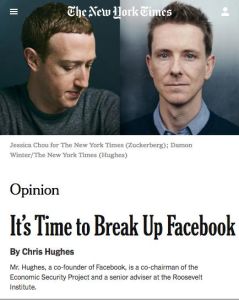
Chris Hughes
It’s Time to Break Up Facebook
The New York Times, 2019
What's inside?
Only the government can save Facebook from itself.
Recommendation
What with data privacy scandals, fake news and Russian interference, Facebook finds itself in the middle of a growing storm. An increasing number of voices in US politics – as well as in economic and legal circles – have started to call for the breakup of the internet giant. Now Facebook co-founder Chris Hughes has joined the chorus. He makes his case in a New York Times op-ed, which has become an instant must-read for anybody interested in the debate about the role of government in the social media space.
Take-Aways
- Facebook CEO Mark Zuckerberg wields unprecedented dominance over social networking and the rules and algorithms governing the online interactions of billions of users.
- The fact that Facebook doesn’t charge users money shouldn’t prevent antitrust regulators from declaring it an illegal monopoly. Users “pay” Facebook by giving it their attention and user data.
- Zuckerberg’s call for an independent commission to police the platform’s content and his push for encrypted private messaging may placate critics but won’t solve the problem of Facebook’s unhealthy market dominance.
- Long-established antitrust law empowers the US Federal Trade Commission and Justice Department to demand spinning off Instagram and WhatsApp and to open up the social networking space to competition.
- Renewed competition will give social media consumers more choice and spark innovation.
Summary
Since Facebook CEO Mark Zuckerberg purchased Instagram and WhatsApp, he wields unprecedented dominance in the social networking space. Billions of people around the world use the platforms regularly, and Facebook now pockets over 80% of the world’s social networking revenue. As Zuckerberg holds the majority vote on the Facebook board, he alone can determine the configuration of news feeds and privacy settings. He also has the final say over what content to remove from the sites, giving him de facto censorship authority over two billion users.
“Mark [Zuckerberg] is a good, kind person. But I’m angry that his focus on growth led him to sacrifice security and civility for clicks.”
Since the 1990s, US courts have become reluctant to enforce the 1890 Sherman Antitrust Act, which outlaws monopolies. US courts didn’t block Facebook’s acquisition of Instagram and WhatsApp, arguing that the company’s quasi-monopoly doesn’t harm consumers since they use the services for free. Yet the return Facebook gets from its users generates immense value that doesn’t always come with an exact price tag. Facebook’s news-feed feature, for example, excels at keeping users on the site longer and longer, generating huge amounts of user data that Facebook can use, among other things, to fine-tune advertising.
“Facebook isn’t afraid of a few more rules. It’s afraid of an antitrust case and of the kind of accountability that real government oversight would bring.”
Zuckerberg has recently tried to respond to increased public pushback by offering encrypted private messaging and calling for an independent oversight commission to police platform content. Yet Zuckerberg’s overtures won’t bring fundamental change. At best, they will help take the wind out of the sails of those calling for the company’s breakup. Only dismantling Facebook and establishing government oversight over social networking sites will prevent Facebook from becoming virtually untouchable by competitors in the foreseeable future. Long-established antitrust law empowers the US Federal Trade Commission and Justice Department to demand spinning off Instagram and WhatsApp and have Facebook executives sell their respective shares. While Facebook shares probably won’t suffer, such a move will encourage Facebook and other social networking entrepreneurs to innovate and compete. The consumer would then have a choice between several viable social networking alternatives that may offer different types of services or levels of privacy protection. Meanwhile, the US government will need to design and regularly update the rules related to hate speech to protect users of the various sites.
About the Author
Chris Hughes is a former roommate of Mark Zuckerberg at Harvard and a co-founder of Facebook.
This document is restricted to personal use only.
My Highlights
Did you like this summary?
Read the articleThis summary has been shared with you by getAbstract.
We find, rate and summarize relevant knowledge to help people make better decisions in business and in their private lives.
Already a customer? Log in here.


















Comment on this summary